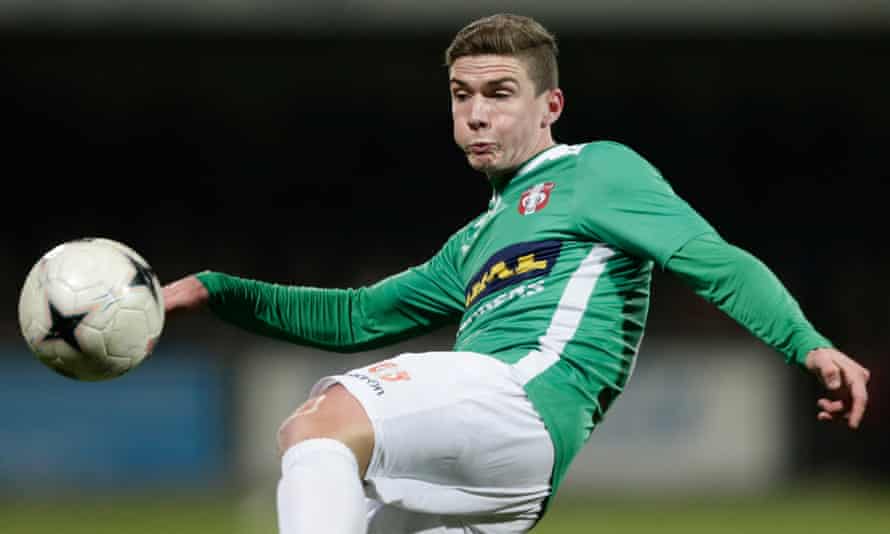On a Tuesday night in October 2013, Harry van den Ham went on a scouting mission. He was trying to get Dordrecht, an unfashionable club 10 miles outside Rotterdam, promoted but felt his side needed something extra in midfield to keep up the heat. The game pitted Vitesse Arnhem’s reserve team, Jong Vitesse, against Jong Top Oss and the missing piece quickly became apparent. “I watched him play and he had such drive, commitment, he gave everything in every duel,” he says of his first encounter with Robin Gosens. “I learned that he was German: he was a typical German player, and that’s what I needed in my team.”
Gosens was 20 and could hardly have imagined that, seven and a half years later, he would be one of the star attractions in a Germany side preparing to face England at Wembley. It had been an unusual journey to Vitesse, who picked him up from tiny VfL Rhede after spotting him during a game in which he shone despite feeling the effects of a night out, but he was yet to make the step to senior football when Van den Ham pitched up.
Vitesse were reluctant to let Gosens leave. But Van den Ham extracted an admission from their then manager, Peter Bosz, that Gosens would not receive much playing time over the following six months and then made his pitch. “I told Peter: ‘This year I want to be champions, and I want him badly,’” he says. “So we made a deal, and I got Robin.”
It became a transformative half-season for Gosens and a historic one for Dordrecht, although the fit was not immediate. Van den Ham inherited a talent that needed some coaxing out. “His style was always: duel, get the ball, pass the ball to another player,” he says. “Not enough initiative, a little bit shy. We talked a lot about this problem because I knew he was a better player than Vitesse had in midfield at the time, but he wasn’t dominant. You have to back yourself, and he missed that.”
Van den Ham knew Gosens had the attributes that have since become apparent to a global audience through his work at left wing-back for Atalanta and, spectacularly, Germany’s Euro 2020 side. Gosens tore Portugal apart in the group stage, scoring once and setting up two; containing him will come near the top of Gareth Southgate’s to-do list and he is performing with an abandon that, once unlocked, was far too good for the Dutch second tier.
“He was always open to talk, receive information and work with it, and he asked a lot,” Van den Ham says. “He had an unbelievable shot and an unbelievable cross, so you had to get him on the other side of the opponent and coming into the box. Once he did that he probably became our best player, in the end. And as he became better and better, his voice in the dressing room also became important.
“I want to play football on the front foot and apply high pressure; I always tell the players that 99% is not enough, and not enough is nothing. So it’s very important that you have people in your team that can transmit your philosophy. Robin was one of them, he gave not just 100% but 110%. The team developed, and he did too.”

Dordrecht were promoted via the play-offs, reaching the Eredivisie for the first time in 19 years. Gosens started 15 games out of 20 for Van den Ham, including both legs of the tie against Sparta Rotterdam that sealed their ascent, and the celebrations could begin.
“I didn’t have to say anything to the players before the play-off because they came to me, Robin included, and said: ‘Trainer, we want promotion,’” Van den Ham says. “It was a miracle in Dutch football but also for the town of Dordrecht, because a good year for us was normally 15th or 16th place. There were 20,000 people cheering for us after we went up and it was unbelievable, a fantastic time for a small club.”
Gosens signed for another year at Dordrecht, establishing himself as a top-flight regular even though he could not stop them going down. He would stay in the Eredivisie with a permanent move to Heracles Almelo before joining Atalanta and, ultimately, reaching for the stars. Van den Ham was poached by Utrecht after Dordrecht’s stellar campaign but has stayed in touch with the player who helped make it possible.
“When he was first selected for Germany I sent him a message saying: ‘Congratulations, when you believe in yourself you can make it,’” he remembers. “Ten minutes later I got a message back: ‘Thank you trainer, I am forever grateful and it’s fantastic that you still follow me.’ That was typical of Robin – he is such a decent boy.”
Van den Ham believes a ferocious work ethic is fundamental to Gosens’ progress and that bypassing a traditional academy schooling has contributed to his style. “It’s very important when you go abroad to have a good mentality, believe in yourself, be intelligent and have drive,” he says. “There’s only thing for him: ‘I want to win and be a better player.’
“Because he missed the youth education he’s unorthodox but he has evolved. He’s a modern player. The way we play the game now, full-backs are like wingers; he has a lot of adventure and can work the whole flank.”
Van den Ham will watch with pride as Gosens looks to put his mark on one of international football’s fiercest rivalries. “I think that year at Dordrecht he got the confidence to develop for the years ahead,” he says. “He is a player every coach would want to have in their team.”
from Football | The Guardian https://ift.tt/3dj6Ixp
via IFTTT

No Comment